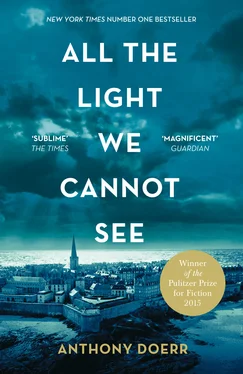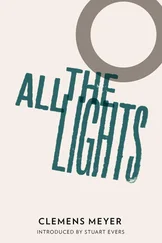Slowly, gratefully, the world settles. From outside comes a light tinkling, fragments of glass, perhaps, falling into the streets. It sounds both beautiful and strange, as though gemstones were raining from the sky.
Wherever her great-uncle is, could he have survived this?
Could anyone?
Has she?
The house creaks, drips, groans. Then comes a sound like wind in tall grass, only hungrier. It pulls at the curtains, at the delicate parts inside her ears.
She smells smoke and knows. Fire. The glass has shattered out of her bedroom window, and what she hears is the sound of something burning beyond the shutters. Something huge. The neighborhood. The entire town.
The wall, floor, and underside of her bed remain cool. The house is not yet in flames. But for how long?
Calm yourself, she thinks. Concentrate on filling your lungs, draining them. Filling them again. She stays under her bed. She says, “ Ce n’est pas la réalité. ”
What does he remember? He saw the engineer Bernd close the cellar door and sit on the stairs. He saw gigantic Frank Volkheimer, in the golden armchair, pick at something on his trousers. Then the ceiling bulb blinked out and Volkheimer switched on his field light and a roar leaped down upon them, a sound so loud it was like a weapon itself, consuming everything, quaking the very crust of the earth, and for an instant all Werner could see was Volkheimer’s light go skittering away like a frightened beetle.
They were thrown. For an instant or an hour or a day—who could guess how long?—Werner was back in Zollverein, standing above a grave a miner had dug for two mules at the edge of a field, and it was winter and Werner was no older than five, and the skin of the mules had grown nearly translucent, so that their bones were hazily visible inside, and little clods of dirt were stuck to their open eyes, and he was hungry enough to wonder if there was anything left on them worth eating.
He heard the blade of a shovel strike pebbles.
He heard his sister inhale.
Then, as though some retaining cord had reached its limit, something yanked him back into the cellar beneath the Hotel of Bees.
The floor has stopped shaking, but the sound has not diminished. He clamps his palm to his right ear. The roar remains, the buzzing of a thousand bees, very close.
“Is there noise?” he asks, but cannot hear himself ask it. The left side of his face is wet. The headphones he was wearing are gone. Where is the workbench, where is the radio, what are these weights on top of him?
From his shoulders, chest, and hair, he plucks hot pieces of stone and wood. Find the field light, check on the others, check on the radio. Check on the exit. Figure out what has gone wrong with his hearing. These are the rational steps. He tries to sit up, but the ceiling has become lower, and he strikes his head.
Heat. Getting hotter. He thinks: We are locked inside a box, and the box has been pitched into the mouth of a volcano.
Seconds pass. Maybe they are minutes. Werner stays on his knees. Light. Then the others. Then the exit. Then his hearing. Probably the Luftwaffe men upstairs are already scrabbling through wreckage to help. But he cannot find his field light. He cannot even stand up.
In the absolute blackness, his vision is webbed with a thousand traveling wisps of red and blue. Flames? Phantoms? They lick along the floor, then rise to the ceiling, glowing strangely, serenely.
“Are we dead?” he shouts into the dark. “Have we died?”
The roar of the bombers has hardly faded when an artillery shell whistles over the house and makes a dull crash as it explodes not far away. Objects patter onto the roof—shell fragments? cinders?—and Marie-Laure says aloud, “You are too high in the house,” and forces herself out from beneath the bed. Already she has lingered too long. She returns the stone inside the model house and restores the wooden panels that make up its roof and twists the chimney back into place and puts the house into the pocket of her dress.
Where are her shoes? She crawls around the floor, but her fingers feel only bits of wood and what might be shards of window glass. She finds her cane and goes in her stocking feet out the door and down the hall. The smell of smoke is stronger out here. The floor still cool, walls still cool. She relieves herself in the sixth-floor toilet and checks her instinct to flush, knowing the toilet will not refill, and double-checks the air to make sure it does not feel warm before continuing.
Six paces to the stairwell. A second shell screeches overhead, and Marie-Laure shrieks, and the chandelier above her head chimes as the shell detonates somewhere across the estuary.
Rain of bricks, rain of pebbles, slower rain of soot. Eight curving stairs to the bottom; the second and fifth steps creak. Pivot around the newel, eight more stairs. Fourth floor. Third. Here she checks the trip wire her great-uncle built beneath the telephone table on the landing. The bell is suspended and the wire remains taut, running vertically through the hole he has drilled in the wall. No one has come or gone.
Eight paces down the hall into the third-floor bathroom. The bathtub is full. Things float in it, flakes of ceiling plaster, maybe, and there’s grit on the floor beneath her knees, but she puts her lips to its surface and drinks her fill. As much as she can.
Back to the stairwell and down to the second floor. Then the first: grapevines carved into the banister. The coatrack has toppled over. Fragments of something sharp are in the hall—crockery, she decides, from the hutch in the dining room—and she steps as lightly as she can.
Down here, some of the windows must have blown out as well: she smells more smoke. Her great-uncle’s wool coat hangs from the hook in the foyer; she puts it on. No sign of her shoes here either—what has she done with them? The kitchen is a welter of fallen shelves and pots. A cookbook lies facedown in her path like a shotgunned bird. In the cupboard, she finds a half-loaf of bread, what’s left from the day before.
Here, in the center of the floor, the cellar door with its metal ring. She slides aside the small dining table and heaves open the hatch.
Home of mice and damp and the stink of stranded shellfish, as if a huge tide swept in decades ago and took its time draining away. Marie-Laure hesitates over the open door, smelling the fires from outside and the clammy, almost opposite smell washing up from the bottom. Smoke: her great-uncle says it is a suspension of particles, billions of drifting carbon molecules. Bits of living rooms, cafés, trees. People.
A third artillery shell screams toward the city from the east. Again Marie-Laure feels for the model house in the pocket of her dress. Then she takes the bread and her cane and starts down the ladder and pulls the trapdoor shut.
A light emerges, a light not kindled, Werner prays, by his own imagination: an amber beam wandering the dust. It shuttles across debris, illuminates a fallen hunk of wall, lights up a twisted piece of shelving. It roves over a pair of metal cabinets that have been warped and mauled as if a giant hand has reached down and torn each in half. It shines on spilled toolboxes and broken pegboards and a dozen unbroken jars full of screws and nails.
Volkheimer. He has his field light and is swinging its beam repeatedly over a welter of compacted wreckage in the far corner—stones and cement and splintered wood. It takes Werner a moment to realize that this is the stairwell.
What is left of the stairwell.
That whole corner of the cellar is gone. The light hovers there another moment, as if allowing Werner to absorb their situation, then veers to the right and wobbles toward something nearby, and in the reflected light, through skeins of dust, Werner can see the huge silhouette of Volkheimer ducking and stumbling as he moves between hanging rebar and pipes. Finally the light settles. With the flashlight in his mouth, in those granular, high-slung shadows, Volkheimer lifts pieces of brick and mortar and plaster, chunk after chunk, shredded boards and slabs of stucco—there is something beneath all of this, Werner sees, buried under these heavy things, a form coming into shape.
Читать дальше












